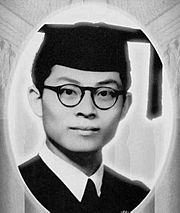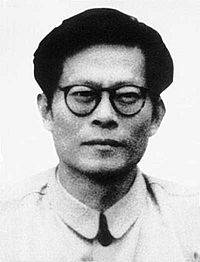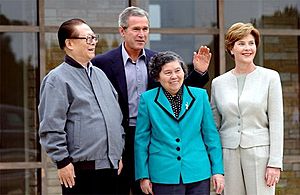Jiang Zemin facts for kids
Quick facts for kids
Jiang Zemin
|
|||||||||||||||||||
|---|---|---|---|---|---|---|---|---|---|---|---|---|---|---|---|---|---|---|---|
|
江泽民
|
|||||||||||||||||||
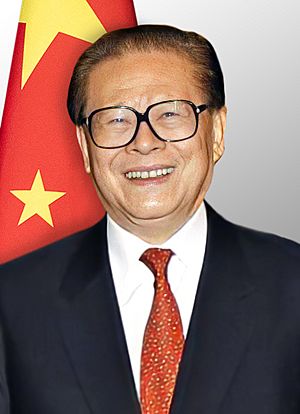
Jiang in 2002
|
|||||||||||||||||||
| General Secretary of the Chinese Communist Party | |||||||||||||||||||
| In office 24 June 1989 – 15 November 2002 |
|||||||||||||||||||
| Preceded by | Zhao Ziyang | ||||||||||||||||||
| Succeeded by | Hu Jintao | ||||||||||||||||||
| 5th President of the People's Republic of China | |||||||||||||||||||
| In office 27 March 1993 – 15 March 2003 |
|||||||||||||||||||
| Premier | |||||||||||||||||||
| Vice President |
|
||||||||||||||||||
| Preceded by | Yang Shangkun | ||||||||||||||||||
| Succeeded by | Hu Jintao | ||||||||||||||||||
| Chairman of the Central Military Commission | |||||||||||||||||||
In office
|
|||||||||||||||||||
| Deputy |
See list
Cao Gangchuan (2002–2005)
Guo Boxiong (2002–2005) Hu Jintao (1999–2004) Chi Haotian (1995–2003) Zhang Wannian (1995–2003) Liu Huaqing (1989–1998) Zhang Zhen (1992–1998) Yang Shangkun (1989–1993) |
||||||||||||||||||
| Preceded by | Deng Xiaoping | ||||||||||||||||||
| Succeeded by | Hu Jintao | ||||||||||||||||||
| Personal details | |||||||||||||||||||
| Born | 17 August 1926 Kiangtu, Kiangsu, Republic of China (now Jiangdu District, Yangzhou, Jiangsu, China) |
||||||||||||||||||
| Died | 30 November 2022 (aged 96) Jing'an District, Shanghai, China |
||||||||||||||||||
| Political party | Chinese Communist | ||||||||||||||||||
| Spouse | |||||||||||||||||||
| Children |
|
||||||||||||||||||
| Parent |
|
||||||||||||||||||
| Alma mater |
|
||||||||||||||||||
| Profession | Electrical engineer | ||||||||||||||||||
| Signature |  |
||||||||||||||||||
| Chinese name | |||||||||||||||||||
| Simplified Chinese | 江泽民 | ||||||||||||||||||
| Traditional Chinese | 江澤民 | ||||||||||||||||||
|
|||||||||||||||||||
|
Central institution membership
1989–2002: 13th, 14th, 15th Politburo Standing Committee
1989–2005: 13th, 14th, 15th, 16th Central Military Commission 1987–2002: 13th, 14th, 15th Politburo 1983–2002: 12th, 13th, 14th, 15th Central Committee 1988–2008: 7th, 8th, 9th, 10th, 11th National People's Congress Other political offices held
1987–89: Communist Party Committee Secretary, Shanghai
1984–87: Mayor, Shanghai 1983–85: Minister, Ministry of Electronic Industries |
|||||||||||||||||||
Jiang Zemin (born August 17, 1926 – died November 30, 2022) was an important Chinese politician. He served as the leader of the Communist Party of China (CCP) from 1989 to 2002. He was also the chairman of the Central Military Commission, which controls the army, from 1989 to 2004. From 1993 to 2003, he was the President of China. Jiang Zemin was considered the "paramount leader" of China from 1989 to 2002. He was a key leader of the "third generation" of Chinese leadership, following Mao Zedong and Deng Xiaoping.
Jiang Zemin became a leader unexpectedly after the Tiananmen Square protests in 1989. He took over as the CCP general secretary when the previous leader, Zhao Ziyang, was removed for supporting student protests. Before this, Jiang was the party leader of Shanghai. As older leaders stepped back, Jiang became the most powerful figure in China during the 1990s. He helped speed up China's "opening up and reform" by introducing the idea of a "socialist market economy" in 1992.
Under Jiang's leadership, China's economy grew a lot as market reforms continued. Big events during his time included Hong Kong returning from the United Kingdom in 1997, Macau returning from Portugal in 1999, and China joining the World Trade Organization in 2001. China also improved its relationships with other countries. Jiang faced criticism for how his government handled the Falun Gong movement, a spiritual group. His ideas, called the "Three Represents", were added to the CCP constitution in 2002. Jiang slowly left his leadership roles between 2002 and 2005, with Hu Jintao taking over. However, Jiang and his political group still had some influence for a while after. He passed away on November 30, 2022, in Shanghai.
Contents
Early Life and Career
Jiang Zemin was born in Yangzhou, Jiangsu, on August 17, 1926. His family came from Jingde County in Anhui. He grew up during the Japanese occupation of China. His uncle and foster father, Jiang Shangqing, died fighting the Japanese in 1939.
Jiang studied Electrical Engineering at National Central University in Nanjing. He later transferred to National Chiao Tung University (now Shanghai Jiao Tong University) and graduated in 1947. He joined the Chinese Communist Party while in college. In the 1950s, after the People's Republic of China was formed, Jiang trained in Moscow, Russia, at the Stalin Automobile Works. He also worked at the First Automobile Works in Changchun.
In 1962, Jiang became the deputy director of the Shanghai Electric Research Institute. In 1966, he was made director of a research institute in Wuhan. When the Cultural Revolution began that same year, he was removed from his position and sent to a "May Seventh Cadre School" for re-education. In 1970, he became a deputy director in the Ministry of Machine Building's Foreign Affairs Bureau. He was sent to Romania to help set up machinery factories. He returned to China in 1972.
In 1979, after China and the United States improved relations, Deng Xiaoping started encouraging "special economic zones" (SEZs) to boost trade and foreign investment. Jiang was appointed vice chairman of two commissions that managed these zones. His job was to make sure the SEZs brought economic growth without bringing in foreign ideas that the Party didn't like. In 1980, Jiang visited SEZs in 12 other countries. He then suggested allowing local areas to offer tax breaks and land leases, which was a big step. These ideas were approved, showing Jiang was an early supporter of Deng Xiaoping's economic reforms.
In 1982, Jiang became the first vice minister and party secretary of the new Ministry of Electronics Industry. In September 1982, he became a member of the Central Committee of the CCP, which helps set policies.
Becoming a Leader
In 1985, Jiang became the Mayor of Shanghai. Some people criticized him, saying he didn't get much done. However, he strongly believed in Deng Xiaoping's economic reforms. In 1986, to calm down student protests, Jiang even recited the Gettysburg Address in English to them.
In October 1987, Jiang was promoted from mayor to Shanghai party secretary, the most powerful job in the city. He also joined the Politburo of the Chinese Communist Party.
In 1989, after the death of former leader Hu Yaobang, the Tiananmen Square protests began. Jiang handled the protests in Shanghai carefully. He met with students and supported the central government's decision to declare martial law in Beijing. On May 20, 1989, Deng Xiaoping chose Jiang to be the new general secretary, replacing Zhao Ziyang. Jiang was seen as a compromise choice and an unlikely candidate for the top job.
When he first became leader, Jiang didn't have a strong power base. He relied on the support of older party leaders. Many thought he would only be a temporary leader. Jiang focused on strengthening political ideas and propaganda work. He also promised to fight corruption.
In the first few years, Jiang depended on Deng Xiaoping's support. Deng became critical of Jiang in 1992, saying reforms weren't fast enough. Jiang then fully supported Deng's reforms. He created the idea of a "socialist market economy", which moved China's economy towards a government-regulated capitalist system. This was a huge step in Deng's vision of "Socialism with Chinese characteristics." Jiang also promoted many of his supporters from Shanghai to high government positions. He became general secretary of the Chinese Communist Party and chairman of the Central Military Commission in 1989. He was then elected president in March 1993.
Jiang's Time as Leader
Growing the Economy
In the early 1990s, China's economy became stable and grew steadily. Jiang Zemin inherited a China with some problems, like corruption and fast-growing regional economies. Deng Xiaoping's policy that "some areas can get rich before others" led to a wealth gap between rich coastal areas and poorer inland provinces. Many state-owned businesses closed, causing unemployment to rise. Jiang's main goal for the economy was stability. He believed a strong central government was needed first, so he put off political reforms. After coastal areas developed, Jiang encouraged richer cities to help poorer western areas with money, technology, and management.
Foreign Relations
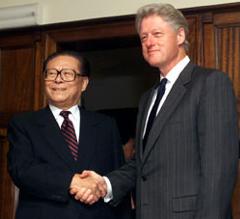
Under Jiang, China continued its approach of using diplomacy to help its development. China's actions on the world stage were generally practical and predictable.
Jiang visited the United States in 1997. He gave a speech at Harvard University, partly in English. In 1999, when NATO accidentally bombed the Chinese Embassy in Belgrade, Jiang showed strong protest at home but took mostly symbolic actions. Jiang's foreign policy was generally peaceful. He was friends with former Canadian Prime Minister Jean Chrétien and worked to strengthen China's economic ties with other countries. However, there were still serious disagreements with the US, like the embassy bombing and the Hainan Island incident in 2001.
Public Image
State media often featured Jiang's activities as top news. Jiang appeared relaxed with Western media and gave an interview to Mike Wallace of CBS in 2000. He often spoke foreign languages on camera. Once, he gave a 40-minute speech entirely in Russian. In 2000, he famously told a Hong Kong reporter that they were "too simple, sometimes naive" in English. Before he left power, Jiang had his "Three Represents" theory added to the Party's constitution in 2002.
Handling of Falun Gong
In June 1999, Jiang created a special office, the 6–10 Office, to deal with Falun Gong. This was because Jiang was concerned that this popular spiritual movement was growing too influential. On July 20, security forces arrested thousands of Falun Gong leaders. The government then launched a nationwide campaign of propaganda and arrested many Falun Gong members.
Stepping Down from Power
As the time for the 16th National Congress of the CCP approached, Hu Jintao had strong support to become the new leader. To show China as a stable country, Jiang and Hu emphasized their unity for a smooth transition. Jiang stepped down as general secretary and left the Politburo Standing Committee, but he kept his role as chairman of the Central Military Commission, which controls the army and foreign policy. It was agreed that Jiang would still be consulted on important state matters.
At the 16th Party Congress, many new members of the Standing Committee were seen as part of Jiang's group, sometimes called the "Shanghai Clique". This included Zeng Qinghong, who was Jiang's chief of staff, and Huang Ju, a former party secretary of Shanghai.
Even after Hu became general secretary, Jiang remained a visible public figure for several years. On September 19, 2004, Jiang, at age 78, gave up his last party post as chairman of the party's Central Military Commission. Six months later, in March 2005, Jiang resigned his last major post, chairman of the Central Military Commission of the state. This marked the formal end of Jiang's political career. Hu Jintao also took over as the CMC chairman. This power change officially ended Jiang's time as China's top leader, which lasted from 1989 to 2004.
Public Appearances After Retirement
Jiang continued to appear at official events after 2004. His name was always listed right after Hu Jintao's. In 2007, Jiang was seen with Hu Jintao at a ceremony for the 80th anniversary of the People's Liberation Army. He also attended the opening ceremony of the Beijing Olympics in 2008 and the 60th anniversary celebration of the People's Republic of China in 2009.
False reports of Jiang's death circulated in 2011, but he later made public appearances, including at the 100th anniversary of the Xinhai Revolution. He also attended the 18th Party Congress in 2012 and the 65th Anniversary banquet of the founding of the People's Republic of China in 2014, where he sat next to Xi Jinping. In 2015, Jiang attended the parade celebrating 70 years since the end of World War II. His last public appearance before his death was at the 70th anniversary of the founding of the People's Republic of China parade in October 2019.
Family and Personal Life
Jiang married Wang Yeping in 1949. She was his cousin, as Jiang's adoptive mother was Wang's aunt. They had two sons, Jiang Mianheng and Jiang Miankang. Jiang Mianheng became an academic and businessman, working in China's space program.
Jiang could speak several foreign languages, including English and Russian. He enjoyed talking to foreign visitors about arts and literature in their own languages and singing foreign songs. He is the only Chinese paramount leader known to speak English.
Death
Jiang Zemin passed away on November 30, 2022, at the age of 96, in Shanghai. Chinese state media reported that he died from leukemia and multiple organ failures.
The government announced that Jiang Zemin was an outstanding leader and a great communist fighter. On the day of his death, national flags were flown at half-staff in key locations and at Chinese diplomatic offices abroad.
Legacy
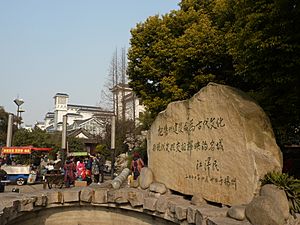
Jiang's successors, Hu Jintao and Wen Jiabao, tried to fix problems and focus on more than just economic growth, like health and the environment.
Jiang's time as leader is viewed differently by people in China. Some believe he brought stability and growth in the 1990s. Others argue that he didn't fix big problems that came from rapid economic reforms, leaving many challenges for the next leaders.
Jiang became a leader after the Tiananmen protests. He first supported conservative economic policies but later fully backed Deng Xiaoping's reforms. This shift caused some confusion. While economic reforms led to great wealth, they also created special interest groups and corruption. This led to an unfair distribution of wealth.
Jiang didn't specialize in economics. In 1997, he gave most of the economic management to Zhu Rongji, who became the Chinese premier. Under their leadership, mainland China's economy grew by about 8% each year. This made China's economy grow faster than most major economies in the world. He also helped China's standing in the world by joining the World Trade Organization in 2001 and winning the bid to host the 2008 Summer Olympics.
"Three Represents"
Jiang's theory of "Three Represents" was added to both the Party and State constitutions. It was placed alongside the ideas of Marxism-Leninism, Mao Zedong Thought, and Deng Xiaoping Theory. However, this theory didn't stay as important for long. By 2007, a new idea, the "Scientific Outlook on Development," was added to the constitution, becoming the main guiding idea for Hu Jintao's time.
The "Three Represents" allowed business owners and capitalists to join the Communist Party. It changed the Party's main goal from protecting workers and farmers to representing the "overwhelming majority of the people." Some critics within the party said this betrayed true communist ideas.
Other Contributions
Some people connect Jiang's time with widespread corruption in the Communist Party. However, many of his biographers say his government was more like a group of leaders working together than a single dictator. Many policies from his time are also credited to other government officials, like Premier Zhu Rongji. Jiang is often praised for improving foreign relations during his term. The building of the Qinghai–Tibet railway and the Three Gorges Dam also began under his leadership.
Awards and Honors
 Brazil:
Brazil:
 Grand Cross of the Order of the Southern Cross (November 23, 1993)
Grand Cross of the Order of the Southern Cross (November 23, 1993)
 Greece:
Greece:
 Grand Cross of the Order of the Redeemer (April 22, 2000)
Grand Cross of the Order of the Redeemer (April 22, 2000) Athens Gold Medal (April 22, 2000)
Athens Gold Medal (April 22, 2000)
See also
 In Spanish: Jiang Zemin para niños
In Spanish: Jiang Zemin para niños
 | William M. Jackson |
 | Juan E. Gilbert |
 | Neil deGrasse Tyson |


